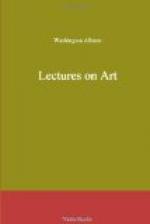Where no such feeling is awakened, and supposing no deficiency in the recipient, he may safely, from its absence, pronounce the work false; nor could any ingenious theory of the understanding convince him to the contrary. He may, indeed, as some are wont to do, make a random guess, and call the work true; but he can never so feel it by any effort of reasoning. But may not men differ as to their impressions of truth? Certainly as to the degrees of it, and in this according to their sensibility, in which we know that men are not equal. By sensibility here we mean the power or capacity of receiving impressions. All men, indeed, with equal organs, may be said in a certain sense to see alike. But will the same natural object, conveyed through these organs, leave the same impression? The fact is otherwise. What, then, causes the difference, if it be not (as before observed) a peculiar something in the individual mind, that modifies the image? If so, there must of necessity be in every true work of Art—if we may venture the expression—another, or distinctive, truth. To recognize this, therefore,—as we have elsewhere endeavoured to show,—supposes in the recipient something akin to it. And, though it be in reality but a sign of life, it is still a sign of which we no sooner receive the impress, than, by a law of our mind, we feel it to be acting upon our thoughts and sympathies, without our knowing how or wherefore. Admitting, therefore, the corresponding instinct, or whatever else it may be called, to vary in men,—which there is no reason to doubt,—the solution of their unequal impression appears at once. Hence it would be no extravagant metaphor, should we affirm that some persons see more with their minds than others with their eyes. Nay, it must be obvious to all who are conversant with Art, that much, if not the greater part, in its higher branches is especially addressed to this mental vision. And it is very certain, if there were no truth beyond the reach of the senses, that little would remain to us of what we now consider our highest and most refined pleasure.
But it must not be inferred that originality consists in any contradiction to Nature; for, were this allowed and carried out, it would bring us to the conclusion, that, the greater the contradiction, the higher the Art. We insist only on the modification of the natural by the personal; for Nature is, and ever must be, at least the sensuous ground of all Art: and where the outward and inward are so united that we cannot separate them, there shall we find the perfection of Art. So complete a union has, perhaps, never been accomplished, and may be impossible; it is certain, however, that no approach to excellence can ever be made, if the idea of such a union be not constantly looked to by the artist as his ultimate aim. Nor can the idea be admitted without supposing a third as the product of the two,—which we call Art; between which and Nature, in its strictest sense, there must ever be a difference; indeed, a difference with resemblance is that which constitutes its essential condition.




